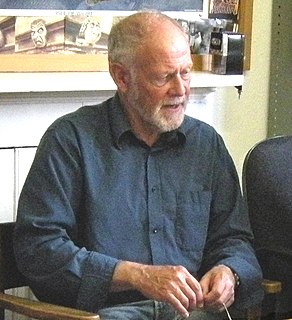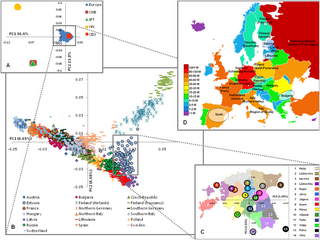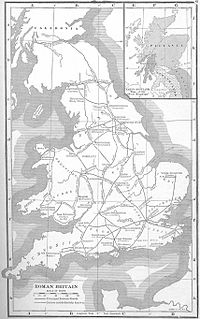A race is a grouping of humans based on shared physical or social qualities into categories generally viewed as distinct by society. The term was first used to refer to speakers of a common language and then to denote national affiliations. By the 17th century the term began to refer to physical (phenotypical) traits. Modern science regards race as a social construct, an identity which is assigned based on rules made by society. While partially based on physical similarities within groups, race does not have an inherent physical or biological meaning.

Sir Barrington Windsor Cunliffe,, known as Barry Cunliffe, is a British archaeologist and academic. He was Professor of European Archaeology at the University of Oxford from 1972 to 2007. Since 2007, he has been an Emeritus Professor.

Elmet, sometimes Elmed or Elmete, was an independent Brittonic kingdom between about the 5th century and early 7th century, in what later became the smaller area of the West Riding of Yorkshire then West Yorkshire, South Yorkshire and North Derbyshire.
Feminist geography is a sub-discipline of human geography that applies the theories, methods, and critiques of feminism to the study of the human environment, society, and geographical space. Feminist geography emerged in the 1970s, when members of the women's movement called on academia to include women as both producers and subjects of academic work. Feminist geographers aim to incorporate positions of race, class, ability, and sexuality into the study of geography. The discipline has been subject to several controversies.
Genetic genealogy is the use of genealogical DNA tests, i.e., DNA profiling and DNA testing, in combination with traditional genealogical methods, to infer genetic relationships between individuals. This application of genetics came to be used by family historians in the 21st century, as DNA tests became affordable. The tests have been promoted by amateur groups, such as surname study groups or regional genealogical groups, as well as research projects such as the Genographic Project.

A DNA segment is identical by state (IBS) in two or more individuals if they have identical nucleotide sequences in this segment. An IBS segment is identical by descent (IBD) in two or more individuals if they have inherited it from a common ancestor without recombination, that is, the segment has the same ancestral origin in these individuals. DNA segments that are IBD are IBS per definition, but segments that are not IBD can still be IBS due to the same mutations in different individuals or recombinations that do not alter the segment.
The Genographic Project, launched on April 13, 2005 by the National Geographic Society, was a genetic anthropological study that aims to map historical human migration patterns by collecting and analyzing DNA samples. The current phase of the project is Geno 2.0 Next Generation. Upon retirement of the site, 1,006,542 participants in over 140 countries had joined the project.
David Noel Livingstone is a Northern Ireland-born geographer, historian, and academic. He is Professor of Geography and Intellectual History at Queen's University Belfast.

Awan is a tribe living predominantly in the northern, central, and western parts of Pakistani Punjab, with significant numbers also present in Khyber Pakhtunkhwa, Azad Kashmir, and to a lesser extent in Sindh and Pakistani Balochistan. They can also be found in Afghanistan. The Awans are descended from Ali's sons, Abbas ibn Ali and Muhammad ibn al-Hanafiyyah.

The most significant recent dispersal of modern humans from Africa gave rise to an undifferentiated "non-African" lineage by some 70-50 ka. By about 50-40 ka a basal West Eurasian lineage had emerged, as had a separate East Asian lineage. Both basal East and West Eurasians acquired Neanderthal admixture in Europe and Asia.
Gillian Rose FBA is a British geographer and geographic author. She is a professor of human geography in the School of Geography and the Environment at the University of Oxford. Previously, she taught and served as Associate Dean at The Open University. She is best known for her 1993 book, Feminism & Geography: The Limits of Geographical Knowledge.

The genetic history of the Middle East is the subject of research within the fields of human population genetics, archaeogenetics and Middle Eastern studies. Researchers use Y-DNA, mtDNA, and other autosomal DNAs to identify haplogroups and haplotypes in ancient populations of Egypt, Persia, Mesopotamia, Anatolia, Arabia, the Levant, and other areas.
The genetic history of the British Isles is the subject of research within the larger field of human population genetics. It has developed in parallel with DNA testing technologies capable of identifying genetic similarities and differences between both modern and ancient populations. The conclusions of population genetics regarding the British Isles in turn draw upon and contribute to the larger field of understanding the history of the human occupation of the area, complementing work in linguistics, archaeology, history and genealogy.

The English people are an ethnic group and nation native to England, who speak the English language and share a common history and culture. The English identity is of early medieval origin, when they were known in Old English as the Angelcynn. Their ethnonym is derived from the Angles, one of the Germanic peoples who migrated to Great Britain around the 5th century AD.

Gabriele Marranci is an anthropologist working on religion with a specialization in Muslim societies. He has been the Director of the Study of Contemporary Muslim Lives research hub at Macquarie University. and Senior Honorary Research Fellow at the Centre for the Study of Islam in the UK. He was formerly Associate Professor at the Department of Sociology at the National University of Singapore. Marranci is the founding editor of the first anthropological journal of Islamic studies, Contemporary Islam: Dynamics of Muslim Life. Together with Bryan Turner he also founded the book series Muslims in Global Societies with Ronald Lukens-Bull serving as an Assistant Editor.
Irish genealogy is the study of individuals and/or families who originated on the island of Ireland.

The Insular Celts are the speakers of the Insular Celtic languages, which comprise all the living Celtic languages as well as their precursors, which originated in Great Britain and Ireland. The term is mostly used in reference to the peoples of the British Iron Age prior to the Roman conquest, and their contemporaries in Ireland.
Ann Phoenix, is a British psychologist and academic, whose research focuses on psychosocial issues related to identity. She is Professor of Psychosocial Studies at the Institute of Education, University College London. She was previously ESRC Professorial Fellow for the Transforming Experiences research programme. She was previously Co-Director of the Thomas Coram Research Unit, and Reader in Psychology at the Open University.
Gill Valentine is a British geographer, currently Professor of Geography and Pro-Vice-Chancellor for Social Sciences at the University of Sheffield. She is a member of the university's executive board and has chaired the Equality, Diversity & Inclusion Committee.
Anne Fuchs, is an academic specialist on modern and post-war German literature and Culture.








